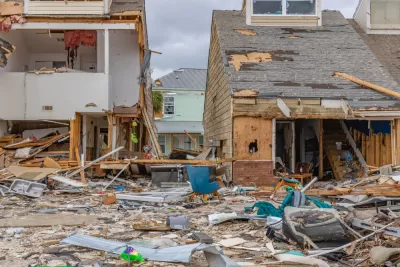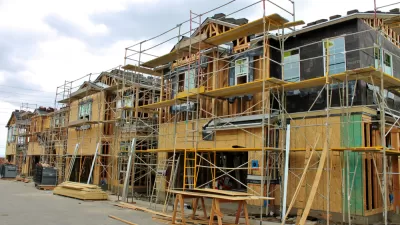Extreme weather is exacerbating the threats posing communities struggling with a lack of affordable housing.

Jared Brey shares news of a recent report from the Center for American Progress, a "left-leaning D.C. think tank with close ties to the Democratic Party," that connects extreme weather caused by climate change to the nation's deepening housing affordability crisis.
The report, "A Perfect Storm: Extreme Weather as an Affordable Housing Crisis Multiplier," says efforts to address the impacts fo extreme weather events "have thus far failed to consider the threat multiplier effect that more extreme weather and scarce supply of affordable housing has on frontline communities."
As noted by Brey, the report also includes recommendations for federal, state, and local policymakers to "build strong, healthy, fair, accessible, and affordable communities that are resilient to future climate change impacts," in the report's words. Those recommendations include Congress acting to "direct HUD and FEMA to coordinate evacuation efforts and housing assistance in the wake of national disasters in racially equitable ways and in compliance with the Fair Housing Act…."
FULL STORY: Facebook Twitter Email Climate Change Is Already Amplifying the Affordable Housing Crisis

Trump Administration Could Effectively End Housing Voucher Program
Federal officials are eyeing major cuts to the Section 8 program that helps millions of low-income households pay rent.

Planetizen Federal Action Tracker
A weekly monitor of how Trump’s orders and actions are impacting planners and planning in America.

Ken Jennings Launches Transit Web Series
The Jeopardy champ wants you to ride public transit.

Washington Legislature Passes Rent Increase Cap
A bill that caps rent increases at 7 percent plus inflation is headed to the governor’s desk.

From Planning to Action: How LA County Is Rethinking Climate Resilience
Chief Sustainability Officer Rita Kampalath outlines the County’s shift from planning to implementation in its climate resilience efforts, emphasizing cross-departmental coordination, updated recovery strategies, and the need for flexible funding.

New Mexico Aging Department Commits to Helping Seniors Age ‘In Place’ and ‘Autonomously’ in New Draft Plan
As New Mexico’s population of seniors continues to grow, the state’s aging department is proposing expanded initiatives to help seniors maintain their autonomy while also supporting family caregivers.
Urban Design for Planners 1: Software Tools
This six-course series explores essential urban design concepts using open source software and equips planners with the tools they need to participate fully in the urban design process.
Planning for Universal Design
Learn the tools for implementing Universal Design in planning regulations.
Heyer Gruel & Associates PA
Ada County Highway District
Institute for Housing and Urban Development Studies (IHS)
City of Grandview
Harvard GSD Executive Education
Toledo-Lucas County Plan Commissions
Salt Lake City
NYU Wagner Graduate School of Public Service





























